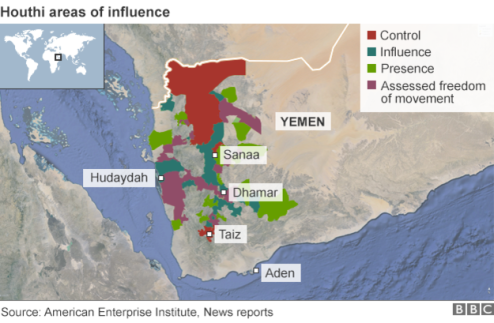By: Ahmed Fathi
New York, Mar 24th: The Middle East continues to take center stage in world affairs from the chronic Palestinian question to the emerging democracy in Tunisia and the terrorism attack on tourists in the capital, to the Nuclear talks between the P5+1 and Iran, and the Israeli meddling in the U.S. Foreign Policy and alleged spying on the negotiations, to the Syrian Civil War entering its fifth year, to Libya complicated situation and turning into the training camp of the jihadist terror cells, to the expansion of ISIL in the four corners of the region, add to all of the above Yemen; with the Houthis rebels backed by Iran took control of the impoverished North and advanced towards the stronghold of the internationally recognized Yemeni President Abdrabu Mansour Hadi strong hold in Aden.
Mounting unrest—including suicide bombings claimed by the Islamic State (IS) jihadist group that killed 142 people in the Houthi-controlled capital Sanaa on Friday—have raised international concerns and prompted an emergency session of the UN Security Council on Sunday, where the 15 members voiced their unanimous support for Hadi, with UN envoy Jamal Benomar warning that without immediate action the country will slide into “further violence and dislocation.” The Security Council at the end of the session issued a presidential statement requesting all parties to adhere to resolution 2201 issued in February 2015, calling on the Houthi rebels to hand over the government buildings seized in the capital and engage in a UN sponsored negotiations by Jamal Benomar the special envoy of the Secretary General. Benomar warned that recent events seem to be leading Yemen to the edge of a civil war,” he told the meeting by video link from Qatar, warning of a protracted crisis like “a Libya-Syria combined scenario.
Yemen, which is a long-time US ally in the fight against Al-Qaeda by allowing Washington to carry out drone strikes against jihadists on its territory, that borders Saudi Arabia from the South and the Sultanate of Oman from the West, is increasingly divided between a north controlled by the Houthis Shi‛ite rebels, who are backed by Iran, and a south dominated by President Hadi supporters, who has turned Aden into the de facto capital of Yemen raising concerns of a full-blown war for control of a globally-strategic oil transit point. To the Arab states, the Houthis are a regional threat, which could become a global problem. If left unchecked, they could choke off the Suez Canal Southern entrance and the Red Sea’s trade routes.
U.S. followed by Britain announced Saturday they were evacuating their remaining Special Forces from Yemen, underlining fears in the West of growing insecurity. But The New York Times reported that even after the withdrawal of American troops, the Central Intelligence Agency will still maintain some covert Yemeni agents in the country. Armed drones will carry out some airstrikes from bases in nearby Saudi Arabia or Djibouti in the Horn of Africa, as was done most recently on Feb. 20. Spy satellites will still lurk overhead and eavesdropping planes will try to suck up electronic communications.” The reported development comes as Yemeni Foreign Minister Riyadh Yassin called on his Arab neighbors from the GCC countries to intervene militarily to stop the inroads made by Shiite Houthi fighters in the predominantly Sunni Muslim country, He also said he had asked the UN and GCC to impose a no-fly zone, after warplanes hit the presidential palace in Aden over the weekend. The Houthis’ rise has alarmed the GCC, and in particular Saudi Arabia, which accuses the Houthis of being a proxy for their key regional rival, Shi’ite-majority Iran. Both of them have denied the Saudi claims.
The forces allied with the Houthis include members of the former central security force, a unit seen as loyal to ousted president Ali Abdullah Saleh who was forced from power in early 2012 after a year-long popular uprising and has been accused of working with the Houthis to restore his influence.
There are robust reasons to consider that the Houthis will not initiate an assault on Aden. Such an act would intensify calls from the GCC States (Gulf Cooperation Council) and the international community for intervention under chapter 7 of the UN Charter, which is something that the supporters of the Houthi rebels specially Iran and the former president Ali Abdullah Saleh – don’t want. Most probably, the group will simply seek to use the threat of an assault to force concessions from President Hadi. Nevertheless the Houthis rebels’ history proves that they are anything but predictable and impulsive and it is impossible to rule out anything with them.
*** Ahmed Fathi is a UN based Journalist and Political Analyst.





